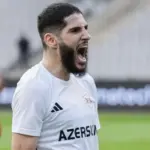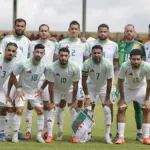We want to build a solid future for Congolese football – DR Congo U-20 coach Guy Bukasa

Since his appointment as head coach of the DR Congo U-20 national team, Guy Bukasa has worked hard to give new momentum to a generation of players who have long lacked international competitions.
Thanks to a solid foundation, a clear vision, and rigorous planning, the Congolese coach led the Leopards to qualify for the U-20 Africa Cup of Nations (AFCON), their first qualification since 2013.
After a difficult start in the UNIFFAC qualifiers, marked by a 1-0 loss to Congo, his team managed to turn things around to secure their spot for the TotalEnergies CAF U-20 Africa Cup of Nations Cote d’Ivoire 2025.
This success reflects the rising power of Congolese football, as seen in the recent performances of the national teams and clubs in the country.
In this interview with CafOnline.com, Guy Bukasa discusses the challenges he faced in structuring this team, the need to unite local and dual-national players, and the lessons learned from past experiences.
He also talks about DR Congo’s ambitions for the TotalEnergies CAF U-20 AFCON in Côte d’Ivoire and the importance of continuity with the senior team, in collaboration with Sébastien Desab.
After Jean-Claude D’Amico in 1989 and Baudouin Lofombo in 2013, you are the third coach to lead DR Congo to a TotalEnergies CAF U-20 AFCON. What does this qualification mean for you and Congolese football?
It is a huge source of pride to have achieved this in very difficult conditions. Thanks to God, the goal was reached. On the national level, it’s an honour to see DR Congo return to this level after several editions without participation. Every Congolese is happy to finally see our young players compete against their African counterparts.
You secured this qualification by winning the UNIFFAC qualifiers. However, your journey began with a complicated loss to the neighbouring Congo (1-0). How did you manage to motivate your team to turn things around?
Honestly, we weren’t too surprised by the start. The reality is that this category is quite particular because this generation didn’t have the opportunity to play at U-17 level. Our players were therefore experiencing international competition for the first time, unlike the Brazzaville boys who had just come from a great U-17 AFCON and had already gained some experience in managing the emotional load at this level.
I had no doubt about the quality of the players selected, but we knew that the start of the competition would be difficult for them: the CAF anthem, the national anthem—these elements made our boys freeze at first, and they were caught off guard. But after this first experience, we reviewed our mistakes, and they fully embraced the competition.
DR Congo have not participated in a TotalEnergies CAF U-20 AFCON since 2013, marking twelve years of absence. What measures were put in place to achieve this qualification and revitalize Congolese football at this level?
When I was entrusted with managing this category, I was also an assistant coach for the senior team and the local team (CHAN).
We organized training camps against more experienced teams like Morocco and Tunisia, who invited us several times. We lost those matches, but they were essential for building a strong group and reconnecting the youth to their patriotic spirit.
Gradually, we succeeded in creating synergy between dual nationals and locals, forging a unified and aware team ready to face challenges.
In two appearances in the TotalEnergies CAF U-20 AFCON, DD Congo has never made it past the group stage. What lessons have you learned from past experiences and what are your ambitions for this edition?
Our goal is to not limit ourselves to just the three group matches.
We want to qualify for the quarter-finals and, if God allows, aim for a spot in the World Cup.
With DR Congo’s qualification for the senior AFCON and Women’s AFCON, TP Mazembe’s victory in the CAF Women’s Champions League, and your recent qualification for the TotalEnergies CAF U-20 AFCON, Congolese football seems to be experiencing a flourishing period. How do you reflect on this?
I believe there’s a collective awareness. The country is going through challenging times, and each team is fighting with additional motivation. There is also an improvement in the quality of coaching, whether for youth, women’s, or senior teams.
Moreover, there is better coordination in managing the various categories, which was not the case before. Even under a normalization committee, we managed to structure harmonious work. Every match is an opportunity for our players to bring joy to our people, especially those going through difficult times.
This competition will be held in Côte d’Ivoire, one year after the senior team’s brilliant run to the semi-finals. Do you engage with the senior team staff to benefit from their experience and ensure continuity in the development of young talents?
We work closely with Sébastien Desabre since his arrival. We regularly engage about the performances of the players and try to standardize our methods of coaching so that they are not out of place when they join the senior team.
This is already bearing fruit: several young players we’ve integrated into our project have now joined the senior team. The goal is to ensure continuity because the national team is one entity with different categories. If a player excels in the U-20 team and the senior staff believes he belongs in the senior team, he will be promoted.
How would you describe your group?
It’s a group that gets along well, both at the staff level and among the players. We’ve worked with a database of about 100 players since this team was formed.
The mix between locals and expatriates has gone well because we managed to unify the team. Previously, we tended to operate with two separate groups, but now, everyone interacts, lives together, and works toward the same goal. There’s no particular ego; everyone is serving the nation.
You are a young tactician; what kind of relationship do you have with your players?
When they need help, we provide it. When we need to be strict, we do that too. This category is very demanding. Today, I work with players born in 2005-2006, an age group particularly exposed to many distractions, more so than their older peers. The internet, phones—all these distractions can negatively impact performance.
It’s not always easy to make them understand that they need to put these things aside to stay focused on their work. Fortunately, we’ve been able to adopt the right approach.
They know that when they join the team, certain things are forbidden, and in return, they have responsibilities to shoulder.
Every day, I remind them of our ambition: to have players in Real Madrid, Liverpool… And this starts with work and success. They are aware of that.
We have to play multiple roles: father, mother, big brother, and sometimes even grandfather. But the most important thing is that, on the field, we are simply coach and player, and everyone must do their job.
There are only a few weeks left before the big adventure in Côte d’Ivoire. What preparations have you planned for the tournament?
The advantage is that most of the boys are active with their clubs. However, the current security situation in the country has led to a temporary halt in local competitions, which has affected some of our players. In some cities, it is even impossible to play.
We will therefore capitalize on the FIFA dates in March to organize a double match against a quality team. Ideally, we would face an experienced team used to this type of competition. This would help us assess ourselves and learn even more.
After that, we will have a closed training camp just before the competition to refine our strategies and arrive fully prepared for the tournament.
This tournament is especially important as it serves as qualification for the U-20 World Cup. Having DR Congo on the world stage is a truly ambitious goal. What does this prospect mean for you and your team?
Of course, when such a challenge arises, every competitor wants to seize it and make the most of it. But our role, as the staff, is to guide the players so that this ambition doesn’t turn into pressure.
It’s a tough challenge for young players who are not yet used to such demands. Our job is to adjust our message, present things in a way that keeps them focused on each match, each performance, without being overwhelmed by the idea of Chile.
Source: CAF




